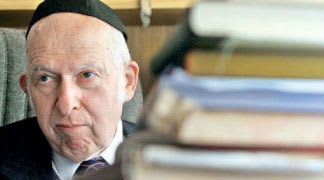On Monday morning, Rabbi Aharon Lichtenstein, the former leader of Yeshivat Har Etzion, English scholar and titan of Modern Orthodoxy both in Israel and abroad, died in his home at 81. Tributes to him poured in from around the world and across the Jewish spectrum — from the president of the Union for Reform Judaism to Agudath Israel.
“Today I mourn the loss of my revered Rabbi and teacher, Rabbi Aharon Lichtenstein zt”l,” wrote Rabbi Ephraim Mirvis, the Chief Rabbi of the United Kingdom. “The Jewish people ha[ve] lost a true giant,”
Born in 1933 in France, Rabbi Lichtenstein fled with his family to America. He was a student of three great Orthodox figures during his formative years, as he described in Jewish Action magazine.
“The Rosh Yeshiva (as his talmidim invariably called Rav Hutner)… simply overwhelmed,” he wrote. “The Rav overawed. I could entertain no rational illusions about attaining their status or stature. But [Rav Aaron Soloveitchik], while an inspiring vision, yet somehow seemed within reach, and truly presented a model. It wasn’t so much what he said or did. I was simply enthralled by what he was–a remarkable fusion of mastery and simplicity, of vigor and humility and, above all, a pillar of radical integrity.”
After graduating Yeshiva University, Rabbi Lichtenstein continued to Harvard University where he earned his PhD, writing a dissertation on Henry More, the Cambridge Platonist. He married Tova Soloveitchik, the daughter of Rabbi Joseph Dov Soloveitchik, in 1960. In 1971, after serving as rosh yeshiva at RIETS, he accepted an invitation from Rabbi Yehuda Amital to be the co-Rosh Yeshiva of Yeshivat Har Etzion. The two led the yeshiva for more than three decades as it became a beacon for rigorous Talmudic study.
According to Rabbi Tzvi Hersh Weinreb, emeritus executive vice president of the Orthodox Union, aside from Rabbi Lichtenstein’s contribution to Talmud Torah, one of Rabbi Lichtenstein’s main accomplishments was the bridge he created between secular knowledge and Jewish knowledge “Rabbi Lichtenstein stressed the intrinsic importance of secular education and the importance of careful scholarship and erudition when studying all aspects of Torah,” Rabbi Weinreb explained.
Rabbi Lichtenstein was awarded the Israel Prize, the country’s highest honor, in 2014.
Rabbi Lichtenstein was also the rare leader who understood action and its consequences. When a group of rabbis issued a ruling forbidding Jews selling land in Israel to non-Jews, Rabbi Lichtenstein responded with a letter that carefully and gently pointed out the flaws in the rabbis’ reasoning, all the while reprimanding the rabbis for their obvious lack of foresight.
“The document leaves one with the impression that its conclusions are based on presumptions that characterize a particular—but not exclusive—halakhic approach,” Rabbi Lichtenstein wrote. “This impression is generated in part by what the document states, and no less by what the document omits.”
He concluded that letter: “We, who dwell in the beit midrash, remain committed to our belief and desire ‘to proclaim that God is upright, my rock in whom there is no wrong.’”
The rosh yeshiva was also equally known for his incredible humility and modesty. As OU Advocacy Center Executive Director Nathan Diament wrote about his own experience with Rabbi Lichtenstein here. A profile of Rabbi Lichtenstein in 2014 described how he let his army students sleep during his shiurim and answered the yeshiva phone with, “Aaron speaking.” As a yeshiva student in the early 2000’s, I heard stories about his great erudition and scholarship, but also more illuminating stories: How the great rabbi, the leader of his generation, did the dishes after he and his wife ate dinner.
Moreover, Rabbi Lichtenstein’s notion of faith was one rooted in humility.
“Faith cannot be contingent upon having all the answers,” he wrote. “Its essence is implied in Rav Yohanan’s rejoinder to a student who had initially ridiculed a palpably implausible statement but who then recanted upon finding empirical support for it: “Ne’er do well, had you not seen, you would not have believed. You ridicule the words of the wise” (Baba Batra, 75a)… The source of faith is faith itself.”
No discussion about Rabbi Lichtenstein is complete without mentioning what he leaves behind. He is survived by his wife Tova, his six children and numerous grandchildren and great grandchildren. Under his watch, Yeshivat Har Etzion launched a sister school and a teacher’s college as well as Yeshivat Har Etzion’s Virtual Beit Midrash, one of the first internet sites that disseminated Torah. He, along with Rabbi Yehuda Amital, appointed two other roshei yeshiva to take their place in 2006, ensuring that there would be no messy succession battle and that the yeshiva would thrive in their absence. As much as Rabbi Lichtenstein will be missed, his legacy will continue.
The words of this author reflect his/her own opinions and do not necessarily represent the official position of the Orthodox Union.

